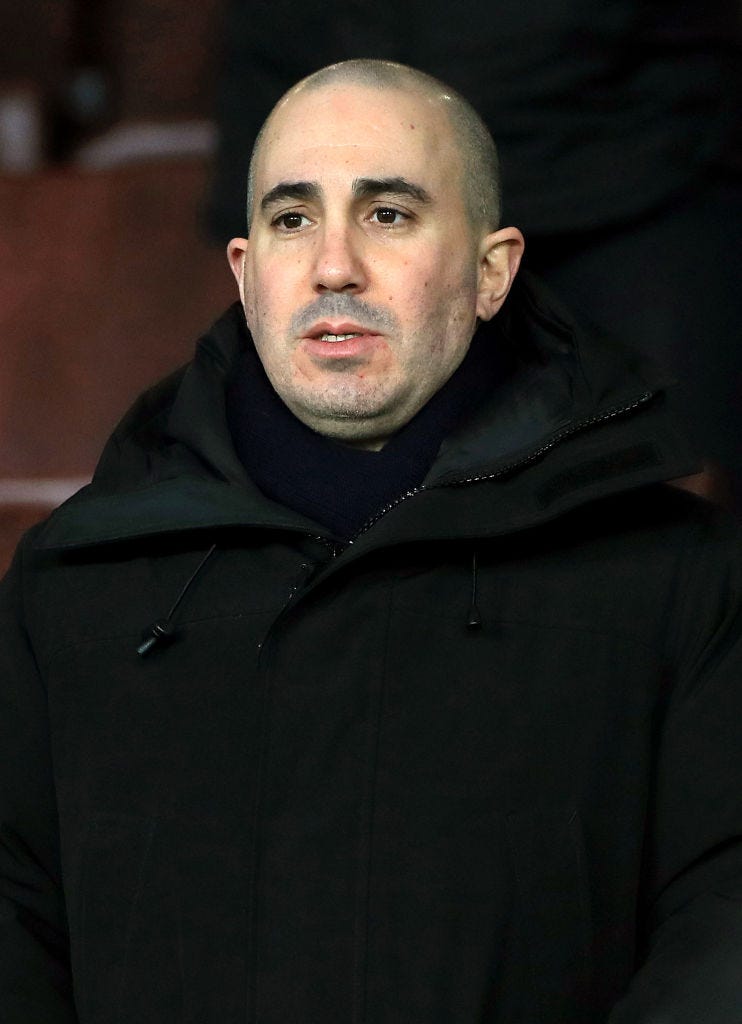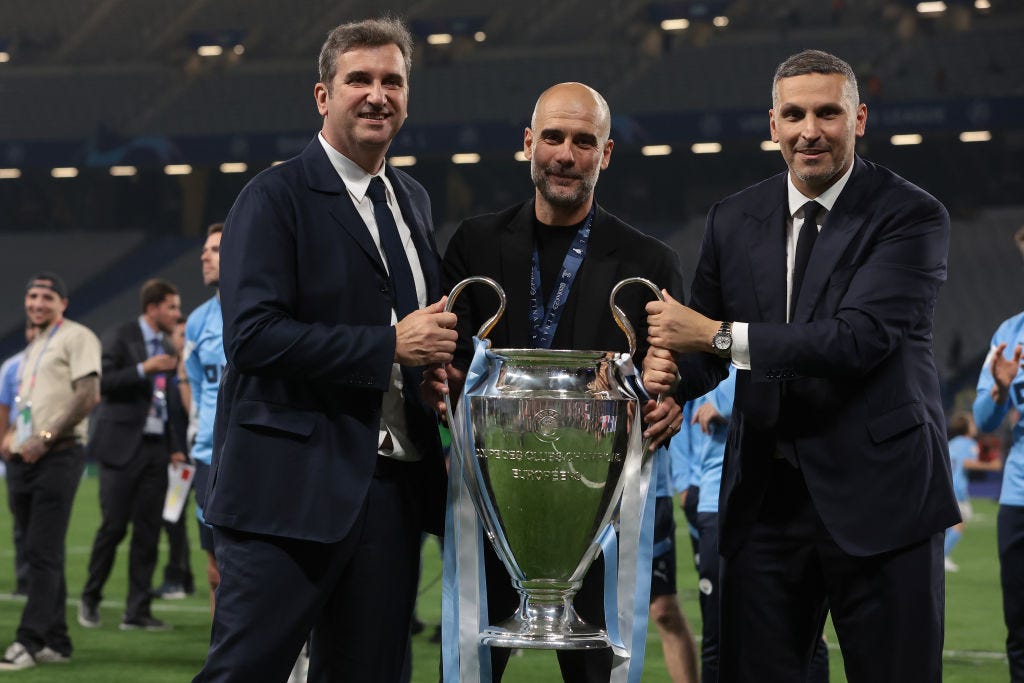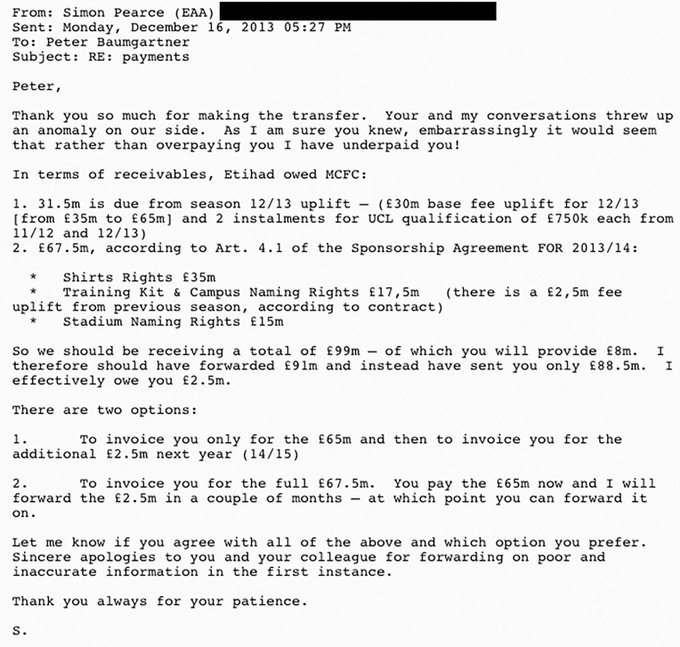Will Man City's paper trail lead to Berrada at Old Trafford?
I answer your questions in the Sporting Intelligence Friday mailbag
Welcome to the first edition of the Q&A, where you, the subscribers, pose the Qs and I’ll be trying come up with straight As. There’s no fixed formula or number of questions each week. If there are Qs that require lengthy answers then so be it, and if there are questions that can be answered briefly, I’ll be brief. We’ve had so many questions this week that we’ll be answering them across two posts, today and tomorrow. If you submitted a question this week that hasn’t been answered, I’ll do my best to get around to it next week or soon.
Onto this week’s topics…
Omar Berrada - The Man Who Knew Too Much?
This one came in via Twitter from Ben McCabe, a Manchester City fan, and also a Sporting Intelligence Substack subscriber. Ben says:
Thoughts on Omar Berrada (below) being appointed CEO of Manchester United given that he was so close to all the alleged financial doping and inflated sports deals you have covered over the years? You would imagine Manchester United have done their due diligence and wouldn't want to be associated with a potential guilty party?

Nick Harris: Hi Ben and thanks for the question. I’m aware of precisely how important financial integrity is to City’s owners, senior management and fans. So, let’s quickly recap what I think you mean by “all the alleged financial doping and inflated sports deals you have covered over the years”.
i: It was obvious as far back as the 2011-12 season, when Financial Fair Play (FFP) monitoring began, that City were willfully overspending and would fail FFP. As I wrote more than 12 years ago: “It is inevitable City will fail to meet the first FFP break-even target.” City could simply have spent less, on transfers and wages, and not failed. They opted not to do that.
ii: City did indeed break the FFP rules at the first hurdle, and in 2014 were fined €60m and had to implement squad and wage cuts. The fine was later reduced to ‘only’ €20m for implementing those changes. In 2016, I revealed that City had come close to getting kicked out of the Champions League in 2014, but agreed a plea bargain to avoid that punishment and received instead only a fine for their huge FFP breaches. Paris St Germain did a similar deal, and both arrangements were brokered by then UEFA president Gianni Infantino, a sports leader whose integrity we know all about.
iii: As the 2016 article in point ii above details, City’s income in the 2011-13 monitoring period was boosted in atypical fashion by the sale of £47m of ‘intellectual property’ to related and third parties. This was deemed irregular by UEFA and City agreed not to repeat such transactions.
Other anomalies included a win-related bonus of more than £5m, paid by a Middle East sponsor, for the 2013 FA Cup final… despite City losing that final to Wigan. Two other City commercial contracts from UAE-based partners, Aabar and Etisalat, were deemed way above market rates. Four years after my 2016 report, The Guardian, in 2020, also revealed that UEFA’s auditors of City in 2014 were denied access to full financial records to do their job; and detailed how City, in fact, posted excess losses totaling about €180m in 2012 and 2013, far more than the €45m FFP maximum allowed. City were punished back in 2014 not unfairly, but for creative accountancy, or cooking their books.
iv: Unbeknown to anyone at UEFA when the 2014 fine was meted out, but later revealed by the Football Leaks documents, Simon Pearce, a City board member — as well as one of the most senior advisors to Sheikh Mansour — had written in December 2013 to Peter Baumgartner of Etihad (City’s main sponsor), detailing how Etihad would provide just £8m of £99m of Etihad sponsorships. See below.
v: When UEFA again found City guilty of financial irregularities and they appealed to the Court of Arbitration for Sport (CAS), in 2020, Simon Pearce was asked at CAS: “Have you ever arranged any payments to be made to Etihad in relation to its sponsorship obligations of Manchester City Football Club?” Pearce answered: “Absolutely, categorically not.” The December 2013 email above was only put into the public domain after the CAS case, on the face of it seeming to show that Pearce had not been truthful at CAS, where a two-year Champions League ban for City was overturned. City refused to comment when asked about Pearce’s CAS statement and the December 2013 email.
I reported on this in greater detail in 2021, having obtained more material about anomalies in City’s claims of innocence, and also having established that City were desperately trying to keep secret the fact that the Premier League were then also almost three years into their own investigation into City. The club had gone to the High Court to try to keep that secret but the Mail on Sunday won a ruling to reveal what was happening.
vi: City ended up with their 2020 Champions League ban (later overturned) and another €30m fine (later reduced to ‘only’ €10m) for not co-operating with UEFA, following a series of explosive allegations in the Football Leaks series. These included multiple allegations of financial malpractice in relation to Abu Dhabi-based sponsors (documents here), and in relation to Roberto Mancini’s contracts (documents here), and alleged illicit payments to Yaya Toure (documents here), and forbidden international trading of under-age players (documents here), among other things.
vii: In February 2023, almost four-and-a-half years after the Premier League launched a formal investigation into alleged financial and other malpractice, City were charged with 115 counts of Premier League rule breaches. The charges relate to matters believed to include failing to provide accurate financial information; not disclosing full details of Mancini’s wages; not disclosing certain payments to players, including Yaya Toure, and, via relatives, to underage players; breaching UEFA’s FFP rules; breaking the PL’s own profitability and sustainability rules; and not co-operating with the Premier League investigation.
That’s about as succinct as the case against City can be, although I’ve written in a lot more detail about the stuff above and other City dealings over the past dozen years or so.
Back to Ben’s question: Thoughts on Omar Berrada being appointed CEO of Manchester United given that he was so close to all the alleged financial doping and inflated sports deals you have covered over the years?
Firstly, for those who don’t know, Omar Berrada is currently (albeit on gardening leave) the chief football operations officer at City Football Group, in effect the parent company of Manchester City and the other 12 clubs in the CFG stable. And he will become Manchester United’s new CEO in a few months’ time.
He has held various roles at City since going there in late 2011, including developing international business (including overseas tours and marketing), working on club partnerships, and working as the group (CFG) commercial director, before becoming the group chief football operations officer in 2020.
The pecking order at City, in terms of control and overall strategy, is headed by Khaldoon Al Mubarak, a senior Emirati government official as well as MCFC’s chairman, and also CEO of Mubadala, one of the sovereign wealth funds of Abu Dhabi. Working closely with him is another government advisor and string-puller, Simon Pearce. Below them is MCFC’s CEO Ferran Soriano, and below him is Txiki Begiristain, City’s director of football. Berrada is approximately on a par with Begiristain in City’s seniority, and has operated in various fields, including player recruitment, over the years; and it is not the case that he was “so close to” the events outlined in bullet points one to seven above.

I have three reasons for saying this. First, in all the hundreds of pages of documents and leaks and emails I’ve seen over the years about apparently strange dealings, I’ve never seen his name in any of them. I’ve seen Khaldoon’s and Pearce’s and Soriano’s and the names of various execs from Etihad. I’ve seen City lawyer Simon Cliff’s name, and former MCFC chief operating officer Graham Wallace’s, and MCFC board member John MacBeath’s and former MCFC head of finance Andrew Widdowson’s, and current CFG CFO Jorge Chumillas’s, among others. But I haven’t seen Berrada’s.
Second, various sources — including former and current employees at both City and Etihad — have alleged to me that at the highest level, in deals between the major Abu Dhabi-based sponsors and City, the contracts and the money have always been dealt with “at the top”, orchestrated by Khaldoon and Pearce. One person with inside knowledge of City’s commercial department told me that when “ordinary” commercial deals are negotiated by that department, bonuses are paid on completion and renewals. But no such bonuses were paid for Abu Dhabi-based sponsors in that person’s time at the club.
The third reason I don’t think Berrada was particularly close to the events that got City into trouble, at least in 2014 and 2020, is that he wasn’t even at the club when key deals were put together at the start of the 2010s.
Ben’s question asks whether Manchester United would have done due diligence on Omar Berrada and I’m certain they will have. I cannot imagine they wouldn’t have asked him what he knew, or didn’t, about a case that has resulted in 115 Premier League charges. One has to assume that he didn’t say he was involved in wrong-doing.
It remains the case, of course, that City could be totally cleared of the 115 charges, and that a tribunal finds all the allegations against them to be unfounded. Berrada and everyone else at City over the period in question would then be free from suspicion.
Or maybe Berrada himself thinks there will be a different outcome, wasn’t involved and doesn’t want to be anywhere near City when that happens. Only he can tell you that, Ben. And I’m not convinced he’ll be doing interviews about it any time soon.
Paul Pogba - Testing Times
Hi Nick, I saw Juventus have reportedly cut Paul Pogba's wages since he failed a drug test. Given he hasn't been convicted, do you think this can actually be true? It seems unfair, also given the fact it is the Juventus medical staff's job to avoid such problems. Thanks, Rupe.
NH: Hi Rupe, and thanks for the question. For readers not aware of the details, Pogba tested positive for metabolites of prohibited non-endogenous testosterone after a match in August 2023. News broke about that in September, and his B sample confirmed the positive in October. He was provisionally suspended from the point the first positive was confirmed, and he was meant to face a hearing at the Italian Anti-Doping Court (the TNA) on January 18.
However, his lawyers requested that that hearing get pushed back until at least mid-February as they try to put together a case that either gets him off, or gets him a ban much shorter than the four years he might otherwise expect. As he turns 31 in March, a four-year ban would effectively end his career. The TNA granted the extension.
It is understood that his defence will be based around the fact he actually tested positive for a substance called DHEA, which is also banned and boosts testosterone, but isn’t testosterone itself. If this is indeed his legal strategy, it could involve a claim of taking a contaminated supplement unwittingly. This alone wouldn’t get him off but might attract a lesser punishment.
So far, so simple.
As for the money, Pogba’s basic salary at Juventus is around £9m a year, or about £750,000 per month (£173,000 per week). Juventus have, for now, cut this to around £3,000 per month. Under rules negotiated between Italy’s clubs and the players’ union in that country, clubs are not obliged to pay any professional more than £36,000 a year (£3,000 a month) while suspended.
Pogba is suspended because he failed a drugs test, a finding ratified by a B sample. Juventus cannot in good faith let a doping suspect continue to play in those circumstances.
It is Pogba himself who requested a delay in his court hearing, and therefore, effectively, an extension of his suspension. If he ends up with a ban of any length, then there are almost certainly provisions in his contract that might see him fired for misconduct.
Juventus might not sack him if he receives a short ban, after which he could return to play for them. Things would get more interesting if he were completely exonerated — which is unlikely. He could have a case to get full pay restored immediately, and maybe even some back pay.
As for Juventus’s medical team. Mmmm. Don’t get me started.
Half-time reading
This one comes from ‘All Sports Books’ who asks:
Do you read sports books and if so which are your all-time favourites? If not, what books do you enjoy / recommend?
NH: My reading tastes, a bit like my music and TV tastes, are pretty eclectic, so I will move randomly between fiction and non-fiction, literary novels and best-selling thrillers, autobiography, history, sport, whatever. I have loved so many different books it’s hard to pick out just a few but in the sport genre The Miracle Of Castel Di Sangro (1999) by Joe McGinniss is up there for me. I read it when it came out and loved it. I rarely read any book twice but I read it again during the pandemic and it blew my mind how much more I took from it, being two decades older! Among other sports books I’ve felt enriched by, there’s Joe DiMaggio: The Hero's Life by Richard Ben Cramer, and Seabiscuit by Laura Hillenbrand. Alex Ferguson’s autobiography was good, and so was Andrea Pirlo’s I Think Therefore I Play.

Away from sport, the best novel I’ve read recently was Lessons in Chemistry by Bonnie Garmus, and before that Pachinko by Min Jin Lee. Empire of Pain by Patrick Radden Keefe is the astonishing, true and tragic story of America’s opiod crisis and I highly recommend that. My all-time favourite books for reasons probably related to the time and place I read them include Cannery Row by John Steinbeck, Kitchen by Banana Yoshimoto, An Evil Cradling by Brian Keenan, and To Kill A Mockingbird by Harper Lee. I’m also happy to devour crime fiction, from John Grisham (although his latest is absolute tosh), to Michael Connelly and Richard Osman. Steve Cananagh, if you’ve not heard of him, is fantastically clever in this genre and I also love Val McDermid. And David Nicholls, of course. Oh, and I haven’t even mentioned Nick Hornby yet. And so many more, perhaps for another time.






Thanks for answering my question Nick. Great choices on all fronts. I feel like Miracle of Castel de Sangro is the Claude Makele of football books - the underappreciated gem that is actually widely appreciated! I re-read it during COVID as well and, while I still loved it, I was struck by how much 40 year old me disliked McGinnis compared to when I first read it.
I have kept a list of the answers given to the same question by over 200 sportswriters if anyone is interested - https://allsportsbookreviews.substack.com/p/the-sports-books-that-sportswriters